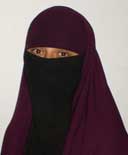What women want! |
Born in Tennessee to Egyptian immigrant parents, I have never lived outside of the United States. I entered college at 15 with the full support and encouragement of my Muslim father. At 22, I completed my Masters degree in Mechanical Engineering from the University of Illinois-Urbana Champaign, one of the top engineering universities in the world.
After a stint in the corporate world, which after experiencing firsthand sexual harassment and intimidation, I left to discover my spirituality, my femininity and my true self-worth. As a result of this journey of self-discovery, I started to wear the niqab. I began to choose jobs that allowed me to work on my terms rather than in an environment that compromised my values.
In fact, I started my own engineering research firm and opened an Islamic clothing store. It was then that I realized how extremely fortunate I am to live in the United States where my freedom of religion and expression are vehemently defended and valued.
I daresay there are few women in the West who don’t question their image, or have concerns about their weight, body measurements, skin texture and coloring. A woman’s body can easily become a commodity, either for her own vanity or someone else’s objectification. These are societal pressures that are imposed on women, but the majority of women really seek security, respect, love, and commitment.
I have found that modesty and Islamic dress gives me that sense of value, control, and security. Wearing a full face veil for the first time gave me an unexpected self-confidence because I no longer cared what others thought of me, only how I thought of myself. For a Muslim woman who covers, her sexuality is under her control and expressed in the confines of her marriage in an atmosphere of commitment and respect. In this way, modesty becomes a liberator and a source of empowerment.
These facts are not being recognized by the policy-makers who pass legislation banning the niqab, such as the one recently made into law in France. In their attempt to protect women, some European countries are taking away the freedom of choice they claim to promote. Legislators need to confer with the range of Muslim women in an attempt to understand the reasons behind the choice to wear the niqab. This will ensure that diversity is embraced rather than outlawed.
We must move forward into a new discourse that is neither gender nor religiously exclusive. If legislation is based on the grounds of protecting the rights of Muslim women, their voices must be a vital part of the debate. Books such as I Speak for Myself are an effort to finally give Muslim women such a voice. Otherwise, the current debates have, in fact, lost sight of the real issues: a woman’s right to freedom of choice and religious expression.








 Hebah Ahmed lives in New Mexico with her husband and two children. She is an Associate writer of
Hebah Ahmed lives in New Mexico with her husband and two children. She is an Associate writer of 
Post new comment